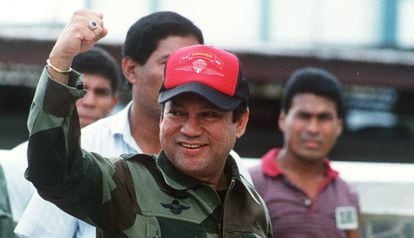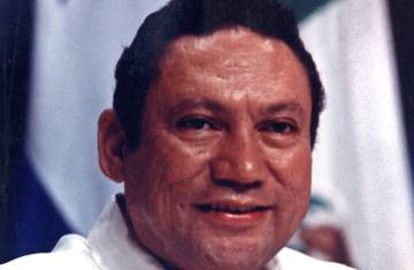Former Panamanian dictator Manuel Noriega dies aged 83
One-time US ally toppled in 1989 invasion had been released from jail, but held in hospital

Manuel Antonio Noriega, the former military ruler of Panama, died on Monday at the age of 83, bucking the trend of most 20th century Latin American dictators: despised at home, found guilty by the courts and having spent almost three decades in different jails. He was spared death behind bars due to a brain tumor, for which he was being treated in a hospital in the capital of the Central American nation.

More than 27 years have passed since Noriega, dressed in the uniform of a general of the Panamanian armed forces, handed himself over to US troops that had invaded his country, ending six years of military rule that began in 1983.
Since that day, January 3, 1990, Noriega has spent most of his time in jail, first in the United States, and then in France and Panama.
“Death of Manuel A. Noriega closes a chapter in our history; his daughters and family deserve a peaceful funeral,” tweeted Panama’s President Juan Carlos Varela on Monday evening.
Muerte de Manuel A. Noriega cierra un capítulo de nuestra historia; sus hijas y sus familiares merecen un sepelio en paz.
— Juan Carlos Varela (@JC_Varela) May 30, 2017
A CIA informant since the 1950s, and referred to by agency head Bill Casey in the year he was arrested as “my boy,” Noriega rose to power through his ability to keep the United States happy, while maintaining good relations with Castro in Cuba, Daniel Ortega in Sandinista Nicaragua, as well as Pablo Escobar’s Medellín drug cartel, which used the country as a staging post to ship cocaine into the United States. It was Noriega’s links to drug trafficking that brought about his downfall.
Noriega climbed his way up through the ranks of the Panamanian armed forces, supporting military ruler General Omar Torrijos, who died in an air accident in 1981, the circumstances of which have never been clarified. From that moment on, Noriega, who ran the intelligence and security services became Panama’s ruler.
In the final decade of the cold war, Panama had become a key ally of the United States, a time when the Cuban Revolution appeared to be consolidating and the Sandinistas and other left-wing guerrillas were fighting in Central America.

While supporting the United States in its counter-insurgency operations in the region, Noriega plunged his country into an unprecedented economic, political and social crisis. Any opposition was ruthlessly stamped out: opposition leader Hugo Spadafora was found decapitated in 1985.
Noriega eventually became a liability for Washington: the CIA continued to support him, but the Drug Enforcement Agency (DEA) had amassed evidence of his drug trafficking links to Colombia’s drug bosses.
In 1988, he was accused by a US court of drug trafficking. In December 1989, following rigged elections and a failed coup against Noriega, US President George Bush, himself a former CIA director, gave the order to bomb Panama ahead of an invasion to capture Noriega, who eventually gave himself up on January 3, 1990
In 1992, Noriega was tried before a US court and sent to jail for 40 years, later reduced to 30 years. He was kept in relatively comfortable conditions, enjoying privileges denied most prisoners. In April 2010 he was released and extradited to France, where he was found guilty of money laundering. A year later, he was extradited to Panama, where he had been found guilty in absentia of involvement in the murder of Spadafora and given a 20-year sentence.
It was Noriega’s links to drug trafficking that brought about his eventual downfall
Since March, Noriega had been in an intensive care unit after undergoing two operations in less than eight hours and then suffering a brain hemorrhage. Months after being extradited from France in 2011, it Noriega was found to have a brain tumor, which his doctors said was growing.
Rubén Darío Paredes, a former head of Panama’s National Guard, insisted at the time that the former dictator’s condition had been exaggerated to secure his release.
Noriega, like so many other Latin American strong men wanted to die a free man. He failed.
English version by Nick Lyne.











































